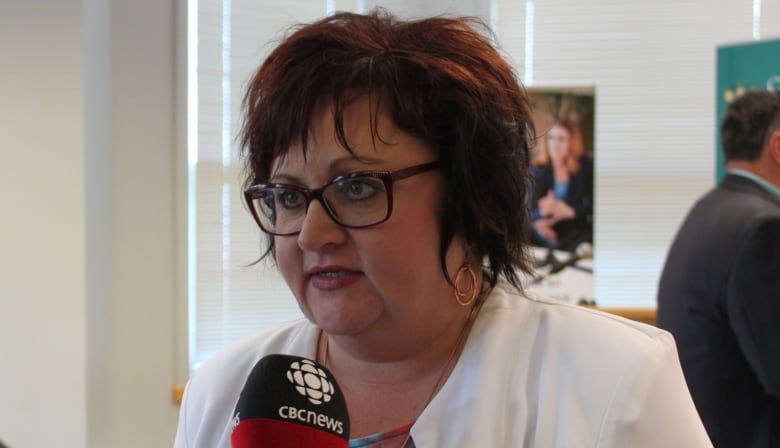Deeper cuts to emergency rooms, hospitals outlined in 2014 health plan
Report recommended changes far more extensive than those cancelled this week
Health officials in New Brunswick have been sitting on proposals for more hospital downgrades and emergency-department closures far more sweeping than the ones announced and then cancelled by the Higgs government this month.
They include the complete shutdown of the six ERs that would have been closed only at night in last week's reform, according to a 2014 document obtained by CBC News.
Several other emergency departments at larger hospitals in Waterville, Campbellton, Tracadie and Miramichi would no longer have 24-hour, seven-day-a-week operations.
The proposals are in a November 2014 report to the then-new Liberal government by the Clinical Services Planning Advisory Committee, made up of officials from the Department of Health and the Horizon and Vitalité health authorities.
"Public opinion reflects the desire to have access to Emergency Department Services 365 days per year, 24 hours a day," says the 308-page report.
"However, there is a shortage of resources to be able to fulfil this desire. … It is not clinically sustainable to maintain 20 ERs in New Brunswick."
The changes announced last week and cancelled five days later amount to a milder version of the 2014 proposals.
ERs in Sackville, Sussex, Perth-Andover, Sainte-Anne-de-Kent, Caraquet and Grand Falls would have closed nightly from midnight to 8 a.m., an announcement that sparked outrage in those communities.
In the 2014 document, the advisory committee went further, recommending the complete closing of those six emergency departments as well as those in Saint-Quentin and at St. Joseph's Hospital in Saint John.

A table includes the phrase "repurpose facility" under those hospitals. The document says they would no longer be considered hospitals.
The same table says emergency departments at hospitals in St. Stephen, Oromocto, Waterville, Campbellton, Tracadie and Miramichi would become "urgent care centres."
Emergency departments there would no longer operate around the clock and no longer receive patients in critical condition by ambulance.
That would leave only six full hospital emergency departments in the province: in Saint John, Fredericton, Bathurst, Edmundston, and at two hospitals in Moncton.
Health authorities wanted more reforms
At the Feb. 11 news conference announcing the changes, Vitalité CEO Gilles Lanteigne said the health authorities wanted more reforms than what the Progressive Conservative government had approved so far.
"Did we get everything that we wanted? I don't think so, but there are new phases coming," he said.
"As we move into other directions I am convinced that we will continue to get support. … We received what we needed now, and now we're moving on to the next phase."
Both Lanteigne and Horizon CEO Karen McGrath said they had plans dating back more than a decade that previous governments had refused to implement.
Lanteigne said following the premier's cancellation of the milder reforms that changes are still required "in all spheres of the health sector," despite the cancellation, and "a broader conversation" in the coming months could allow them to go ahead.
At his news conference Monday, Higgs suggested he was aware of other reform "phases" but didn't know exactly what the health authorities were proposing.

"I've heard people talk about phase one, phase two, phase three. Well, I don't have a phase two or phase three that was planned to be implemented," he said.
At last week's announcement, McGrath said the two health authorities were "starting with this plan and moving forward to a clinical services review" and that the government "has given us the approval for all aspects of the plan."
Low-volume hospitals inefficient
The 2014 report says busier hospitals have lower death rates, possibly because doctors and nurses seeing more patients become better at their jobs.
It also says "it is cost-inefficient to operate low-volume hospitals in every community."
The changes hinged on other steps, including community health assessments and new plans for primary care access and long-term care for seniors, as well as strategies for mental health and for acute-care beds — all of which were featured in the Feb. 11 announcement.
Other proposed changes in the document include centralizing a range of clinical services into a smaller number of hospitals. Obstetrics and gynecology would have been offered in six hospitals instead of nine. Pediatrics would be in five hospitals instead of eight.

In 2015, the Liberal government of Brian Gallant floated the idea of turning some small hospitals into long-term care facilities for seniors as part of its strategic program review.
Miramichi Bay-Neguac Liberal MLA Lisa Harris, who sat on the government's program review committee at the time, said at Wednesday's meeting of the Public Accounts committee that she had opposed those changes.
"I've seen the major cuts that are proposed for Miramichi," she said. "I've seen where the hospital would be ripped of obstetrics, cardiology, psychiatric, everything. … The hospital in Miramichi would no longer be a regional hospital.
"I knew it was wrong then and I knew I couldn't let it happen then. … I shared my point of view that it would not be happening under my watch."
Harris confirmed Thursday she was referring to the same 2014 document obtained by CBC News.
'Put it all out there'
In early 2016 Gallant declared there would be no major cuts to health care. Then-Horizon CEO John McGarry, who now chairs the health authority's board, publicly disagreed with the premier at the time and said some smaller hospitals needed to close.
Higgs said on Monday that if other "phases" of the reform plan exist, the health authorities should "put it all out there" during consultations this spring.
"The only one I have reviewed is this one," he said. "If there are other plans in the works, or in the system, I have not gone through any details."


